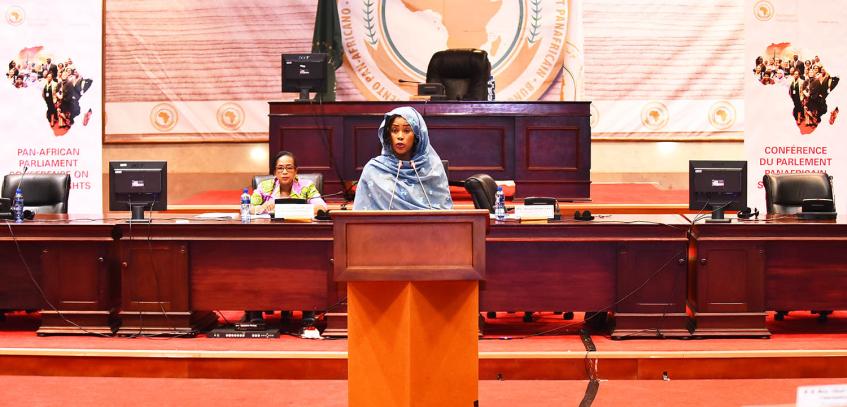A high-level Pan-African Parliament’s (PAP) Women’s convention has roared into life on the sidelines of the ongoing first Ordinary Session of the sixth Parliament of the PAP in Midrand, South Africa with the conference identifying gaps in the implementation and effectiveness of African Union (AU) Legal and Policy frameworks relating to women empowerment, governance and inclusion in governance structures.
Hosted by the PAP Women’s Caucus the 13th Conference on Women’s Rights is held under the theme: “Women empowerment and inclusion in governance” and seeks to tackle issues affecting women across the continent and affording a platform to interrogate the role of women in governance. It also aims to unpack issues about women in decision-making positions and the role of women legislators in addressing the existing gaps between policy frameworks on women’s rights and the actual realities of African women.
Welcoming delegates to the conference, Chairperson of the PAP Women’s Caucus Hon. Amina Tidjani Yaya said the successful convening of the conference yearly afforded African women an opportunity to critically interrogate challenges facing women, strategize, and review past strategies where they fall short.
“The Women’s Caucus is privileged to be hosting this event at the PAP plenary as it gives us a platform to follow up on and assess difficulties women are faced in Africa. The African Union (AU) has adopted many progressive legal instruments to protect women and their autonomy. The PAP is providing a platform for participants from different countries and organizations to discuss the implementation of AU Legal Instruments on gender relating to women empowerment and governance,” said Hon Amina Tidjani Yaya.
While officially opening the conference, the PAP 3rd Vice President, Hon. Lucia Maria Mendes Goncalves Dos Passos commended fellow African women for the resilience shown in the face of various challenges and for rising against all odds to take up leadership positions.
“Hosting an event of such a magnitude tells us that women are the backbone of our continent. Where we have conflicts, women are on the frontline fighting for peace, and we have many unsung heroines making changes in their own way. A wide range of challenges exist in terms of access to employment, equal remuneration and women's participation at the decision-making level,” said Hon Lucia Maria Mendes Goncalves Dos Passos.
In addition, the PAP 3rd Vice President saluted PAP Members of Parliament who are leading Regional Caucuses and PAP Permanent Committees.
Giving his message of support at the conference, the President of the PAP H.E Hon. Chief Fortune Charumbira acknowledged the presence of women from across Africa.
"This is the 13th conference, and the mission and main objective of the PAP are to offer a platform that is important to African women to be able to meet and discuss issues that affect them. If you want to reduce corruption and strengthen governance appoint more women in leadership positions. Equal participation of women in leadership in political and public spheres is essential to strengthening governance and achieving sustainable development, peace and security,” noted H.E Hon Chief Fortune Charumbira.
Through a statement read on her behalf, Ms. Lydia Zigomo, Regional Director for United Nations Population Fund (UNFPA) East and Southern Africa Regional Office (ESARO) recognized the pivotal role that the PAP plays on the continent:
"We truly appreciate the partnership that we have enjoyed with Members of Parliaments across the countries on the continent. We recognise that a lot of achievements that we have made for women and young people stem from the fact that the PAP provides oversight, advisory functions, and consultative spaces, such as this high-level conference,"
The AU Member states have committed to addressing the empowerment of women and making gender equality a reality through various legal instruments where progress has been recorded as evidenced by the ascension of more women to positions of authority across Africa. However, AU Member States still lag far behind in achieving gender parity owing to a wide range of reasons. The legal instruments that came under scrutiny are the Maputo Protocol on the Rights of Women in Africa, AU Gender Policy, Agenda 2063, and the African Women’s Decade 2010-2020.
Ms Dorothy Otieno representing African Women’s Development and Communication Network (FEMNET) underpinned the need for various organizations working on women’s issues to work with the PAP and national parliaments.
“We need to see more women in leadership and governance positions, and we can only achieve this by working with and through national parliaments and the regional and continental parliaments. We have good policies, but there are gaps due to the nature of our political systems and structures that are patriarchal and do not encourage women's participation. In addition, there is a lack of punitive measures on Member States for lack of compliance,” said Ms Dorothy Otieno.
Taking note of the adverse effects of COVID-19 on women’s economic empowerment and sustainable development, Ms Sandzisile Madonsela, Policy Officer with Women, Gender, and Youth Directorate at the African Union Commission alluded:
“The Institute of Social Studies reports that about 30 million Africans fell into extreme poverty at the peak of the COVID-19 era, the majority being women essentially meaning the COVID scourge has taken us steps back in our achievements as women. Therefore, we now need to have a focused lens when developing continental strategies and policies that will guide the implementation of programs. We also need to advocate for financial sector reforms stripping barriers to financial and resource access by women.”
The conference is bringing together parliamentarians from the AU Member States, Members of Parliament of the PAP, representatives of the AU, United Nations and its agencies, women African Diplomatic Corps accredited to South Africa, academics, and civil society organizations specializing in women and youth.
-Ends-








